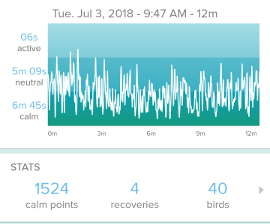Awhile ago, I explained the various kinds of mediation that I engage in (mostly anapanasati is my anchor meditation, with Stoic versions of the prospective and retrospective type, and one kind that doesn't have a name but I call it "default", after the brain's default mode).

I've also recently begun trying out the Muse Headband, a "brain listening" device with a small array of EEG sensors that can detect some brain activity and report on it. The one thing I've discovered is that whatever the Muse is listening for, it's not listening for any of the above.
That session above, from this morning's meditation, is so far my "high score" meditation, but that's probably because I added two minutes to my sessions; about a month ago, I averaged a slightly better one. Today I had "40 moments of extremely stable brainwave activity, with one stability period lasting over five minutes" during a twelve-minute session; a month ago, I managed 44 moments in a ten-minute session.
Some people have had exceptional success using the Muse. I'd like to say I have, too, but so far the results have been mixed. That may be because I've been working off Buddhist and Stoic1 teachings, and the Muse is going for a very different mindset than traditional meditation techniques from either of those traditions. The Muse is using biofeedback to try and teach you how to have a mental mechanism for exceptional calm and focus.
If you're into Buddhism hard-core, the Muse is a bad tool because it's deliberately designed to encourage you to fall into several of The Ten Distractions of Insight. The Ten Distractions are: Illumination, Knowledge, Joy, Tranquility, Pleasure, Confidence, Vitality, Focus, and Composure, and Attachment. Muse is designed to encourage a mindset optimized for joy, tranquility, focus and pleasure. As Buddhist teacher Upasaka Cuadasa says, nine of the ten distractions aren't bad, but if the tenth takes hold, that is, if you become attached to any of them, you'll fail in your journey to bodhisattva. The distractions are called that because they distract you from your journey toward Ultimate Insight.
On the other hand, just a little meditation, even the kinds encouraged by Muse, makes people realize their jobs are probably bullshit because the work doesn't lead to any of those states, and once you've had a taste of them in your mature state you start looking for better things to do with your life than fill out another form, write another client letter, code another login form, or any of the thousands of other things that don't make us pro-social creatures.
1 I'm extremely annoyed and disappointed that ever since William Irvine published his wonderful book, A Guide to the Good Life, Stoicism, like "mindfulness," has started to morph into one of those warning signs of impending assholery when espoused by a twenty-something tech-bro.

I've also recently begun trying out the Muse Headband, a "brain listening" device with a small array of EEG sensors that can detect some brain activity and report on it. The one thing I've discovered is that whatever the Muse is listening for, it's not listening for any of the above.
That session above, from this morning's meditation, is so far my "high score" meditation, but that's probably because I added two minutes to my sessions; about a month ago, I averaged a slightly better one. Today I had "40 moments of extremely stable brainwave activity, with one stability period lasting over five minutes" during a twelve-minute session; a month ago, I managed 44 moments in a ten-minute session.
Some people have had exceptional success using the Muse. I'd like to say I have, too, but so far the results have been mixed. That may be because I've been working off Buddhist and Stoic1 teachings, and the Muse is going for a very different mindset than traditional meditation techniques from either of those traditions. The Muse is using biofeedback to try and teach you how to have a mental mechanism for exceptional calm and focus.
If you're into Buddhism hard-core, the Muse is a bad tool because it's deliberately designed to encourage you to fall into several of The Ten Distractions of Insight. The Ten Distractions are: Illumination, Knowledge, Joy, Tranquility, Pleasure, Confidence, Vitality, Focus, and Composure, and Attachment. Muse is designed to encourage a mindset optimized for joy, tranquility, focus and pleasure. As Buddhist teacher Upasaka Cuadasa says, nine of the ten distractions aren't bad, but if the tenth takes hold, that is, if you become attached to any of them, you'll fail in your journey to bodhisattva. The distractions are called that because they distract you from your journey toward Ultimate Insight.
On the other hand, just a little meditation, even the kinds encouraged by Muse, makes people realize their jobs are probably bullshit because the work doesn't lead to any of those states, and once you've had a taste of them in your mature state you start looking for better things to do with your life than fill out another form, write another client letter, code another login form, or any of the thousands of other things that don't make us pro-social creatures.
1 I'm extremely annoyed and disappointed that ever since William Irvine published his wonderful book, A Guide to the Good Life, Stoicism, like "mindfulness," has started to morph into one of those warning signs of impending assholery when espoused by a twenty-something tech-bro.